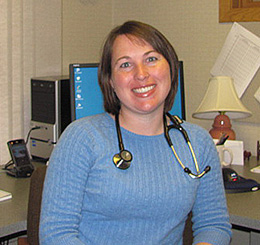
Erin Kimball (’03 BS ALS, ‘07 MD)
Erin Kimball (’03 BS ALS, ‘07 MD) grew up in City Point, a township of 250 in central Wisconsin where her family has lived for four generations. The nearest gas station was 15 miles away; the closest school was 20 miles from her home. As a fourth year medical student in the University of Wisconsin School of Medicine and Public Health, she chose a longitudinal rural track and spent five months at the Krohn Clinic in Black River Falls, population 3,800.
“It was the best choice I made,” Kimball said. “Working with the doctors and nurses at the Krohn Clinic and Black River Memorial Hospital, I learned the art of medicine and what it really means to be a physician.”
The six sons of the late Paul and Alice Bishop hope to encourage more medical students to look at rural practice. They endowed the Dr. Paul R. and Alice P. Bishop Memorial Award to be presented annually to a third-year UW-Madison medical student enrolled in the Wisconsin Academy for Rural Medicine (WARM). The Bishop sons − Neil, Edmund (’73 BS ALS), Paul, Mark (’73 MD), Alan (’78 BS ALS) and William − asked that preference be given to candidates with a strong work ethic who are compassionate and will go the extra mile for their patients.
The longitudinal rural track in which Kimball participated served as a pilot program for WARM, which expects to graduate 25 rural physicians a year by 2015.
Every single patient needs to have a family doctor, someone who’s looking at the entire context of their life.
Mark Bishop
Paul Bishop (’43 BS PHM, ’49 MD) spent most of his career as a rural family doctor; his son Mark also is a family doctor, practicing in Mineral Point, Wisconsin. “We need more family physicians,” Mark Bishop said. “Every single patient needs to have a family doctor, someone who’s looking at the entire context of their life.”
Paul Bishop practiced first in Haynesville, Louisiana, before going into practice with Gibbs Zauft (’46 BS L&S, ’50 MD) in Sauk Prairie, Wisconsin. His dad was well-suited to rural doctoring, Neil Bishop said. “I think he liked the small town atmosphere because he was from a small town. I know he enjoyed the personal relationships that developed with his patients who were community people.”
In Louisiana, Paul Bishop regularly made house calls. “I think he was one of the most conscientious people I’ve ever known in my life,” Neil Bishop said. Anytime anyone called, the question was not if the doctor would go but how soon. Many of Neil Bishop’s driving lessons occurred taking his dad on house calls.
“I never saw him ever begrudge going to see someone,” Neil Bishop said. A rural Louisiana daughter called every Sunday, he remembered. “Mama’s not feeling well,” she’d say. “You’d better come out.” So Neil would drive his dad to the family home, where he was always treated to a heaping plate of food while the doctor visited his patient. Neil also remembered coming home from college to Sauk Prairie, when his dad again asked him to drive out to an older man’s house. The man needed to be hospitalized and had no money for an ambulance, so the Bishops drove him there.
Mark Bishop’s third grade classmates chose historical figures such as George Washington when they were assigned to write about the person they most admired. “I wrote about my dad,” he said. “I realized at a young age that dad’s work and character were admired and respected by many. I saw that as a result of his life he had a significant impact on the lives of others and I wanted my life to count as much.”
WARM was established by the School of Medicine and Public Health to ensure rural communities continue to have access to local physicians. Studies show rural patients are often sicker, poorer, older and more likely to be uninsured, and the nation is facing a growing a shortage of rural practitioners, said Byron Crouse, MD, associate dean for rural and community health and WARM director. The WARM curriculum emphasizes rural public health and medical issues during the first two years of training and allows students to complete most of their third- and fourth-year clinical training in rural communities.
WARM students receive a University education and an introduction to rural living that may convince them to practice in smaller towns. “By having students live in rural communities, they see the quality of life that can be so desirable,” Crouse said.
Kimball said the rural rotation gave her a strong foundation for everything she’s learned since then. “Whenever I have the chance, I encourage young medical students to spend as much time in smaller hospitals and clinic as they can.”
